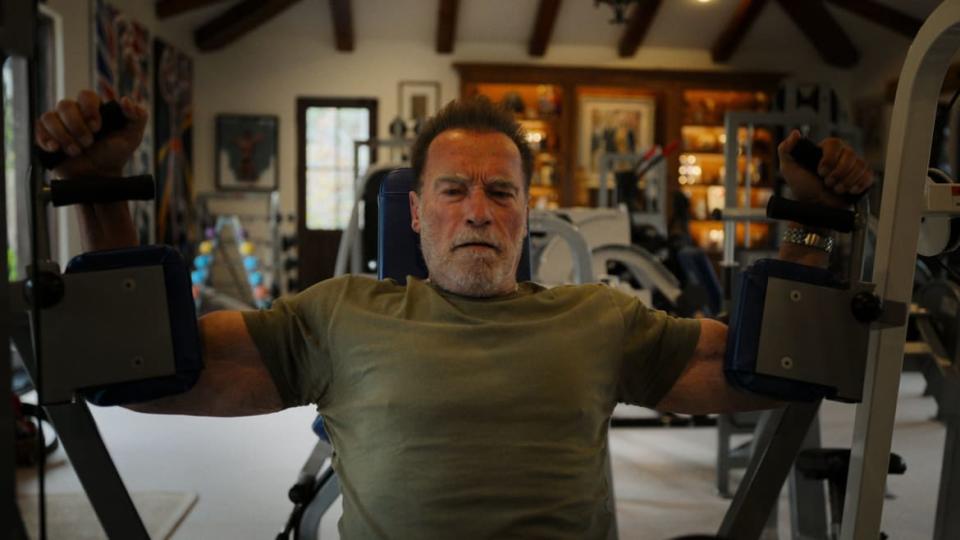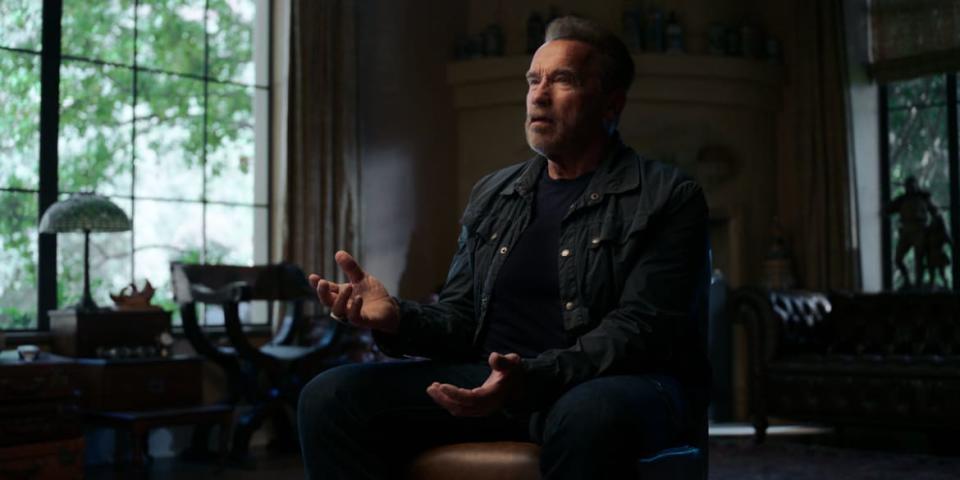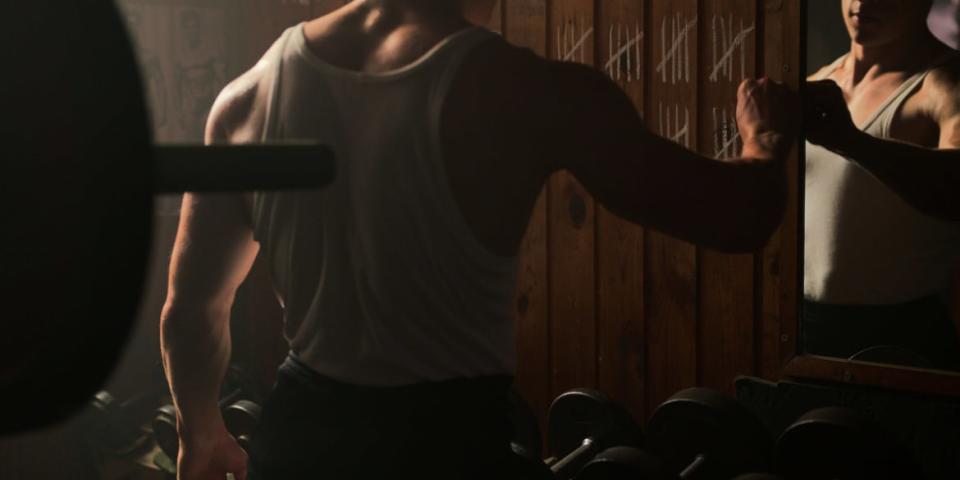Arnold Schwazenegger Cops to His Biggest Scandals in New Netflix Docuseries

Few people embody the American Dream more than Arnold Schwarzenegger, who transformed his love of bodybuilding into a vehicle for athletic, cinematic, and political superstardom.
It was a rise of meteoric proportions, albeit not without its scandals, and Arnold, director Lesley Chilcott’s three-part Netflix documentary (which will be released June 7) about the icon’s tremendous life story, does touch upon the major ones, including the 2003 accusations from multiple women about his sexual misconduct, with Schwarzenegger stating, “It doesn't really matter what time it is. If it's the Muscle Beach days, or 40 years ago, or today. This was wrong. It was bullshit. Forget all the excuses. This was wrong.”
It's a blunt admission from one of Hollywood’s most recognizable and popular leading men, and it’s not the only time during Arnold (arriving on the heels of his underwhelming Netflix series, FUBAR) that Schwarzenegger cops to his failings—something he also does, notably, about the affair and out-of-wedlock child (fathered with family housekeeper Mildred Patricia Baena) that destroyed his 25-year marriage to Maria Shriver.
Nonetheless, as an authorized venture led by new interviews with Schwarzenegger himself, it only skims the surface of those issues; the actor addresses them with a curt bluntness that allows the docuseries to quickly move on to more inspiring material. That’s truest in discussions about Schwarzenegger’s father Gustav, during which he feigns directness—there’s much talk about WWII trauma—without ever actually noting that the man was a Nazi, this despite the fact that Schwarzenegger has previously spoken at length about his dad’s National Socialist past.
Arnold’s candidness thus feels manicured, and hardly designed to plumb Schwarzenegger’s legacy in anything other than rosy terms. Fortunately, for most of its three-hour runtime, it doesn’t have to strain too hard to craft an uplifting and charismatic portrait of dedication and determination.
As he narrates from his palatial home—this when not being spied skiing in the mountains or lounging in a hot tub surrounded by snow, a trademark cigar in his mouth—Schwarzenegger was born in the small, picturesque Austrian town of Thal to a bitter and demanding father and a methodical mother. Abused and denigrated by his dad, especially in comparison to his older brother, Schwarzenegger found his calling when he caught a showing of one of Reg Park’s Hercules movies. Instantly enthralled by the bodybuilder-turned-actor’s physique, a dream was born: to one day be like his idol.
Schwarzenegger soon found a clique of bodybuilders with whom he began to train, and when success came, it swept him up—first to Mr. Universe competitions, and then to New York and Venice Beach, where setbacks were overcome through rigorous collaboration with Joe Weider, champion Frank Zane, and lifelong friend Franco Columbu. Numerous Mr. Olympia titles later, Schwarzenegger was the sport’s all-time greatest.
Arnold Schwarzenegger’s New TV Show Is an Embarrassing Stain on His Action-Hero Legacy
With that arena conquered (replete with a newfound friendship with Park and his clan), Schwarzenegger turned his attention to the big-screen. Though he wasn’t initially taken seriously, 1977’s documentary Pumping Iron confirmed that he was more than just a massive body, providing his magnetism with a widescreen platform that quickly made him a hot commodity in the media and with auteurs John Milius and James Cameron, whose Conan the Barbarian and The Terminator established his action-man bona fides, thick accent included.
Clips from those genre classics, as well as his preceding and subsequent films (be it Hercules in New York, Stay Hungry, or Terminator 2: Judgement Day), are part of Arnold’s nostalgic greatest-hits package. They’re embellished by commentary from Cameron, Linda Hamilton, Jamie Lee Curtis, and box-office rival Sylvester Stallone, who amusingly confesses that he could barely stand to be in the same room as Schwarzenegger during their heyday (“We pushed each other. I wanted to push him off a cliff. Unfortunately, I didn’t find one, so I had to live with him”), and whom Schwarzenegger credits for motivating him to be the best.

Yet despite Stallone’s participation and a brief mention of Planet Hollywood (their joint venture with Bruce Willis), Chilcott’s docuseries doesn’t elaborate on Schwarzenegger and Stallone’s rocky relationship; for the most part, its Hollywood-centric second episode is a sketchy look at the star’s career, marked by soundbites about his signature catchphrase “I’ll be back,” his segue into comedy with Twins (including thoughts from co-star Danny DeVito and the late Ivan Reitman), and the way in which his ascendancy was facilitated by American culture’s shift from the anxious ’70s (typified by Dustin Hoffman and Al Pacino) to the gung-ho bigger-is-better Ronald Reagan ’80s.
Schwarzenegger doesn’t shy away from the projects that didn’t work (like Last Action Hero), nor the political maneuvers that fell short once he became Governor of California. Moreover, he owns up to the fact that his detour into public service put an untenable strain on his family, culminating with revelations about the indiscretion that led to the birth of his son Joseph, which he dubs—as it relates to his marriage to Shriver—“a whole different dimension of failure.”

Still, Arnold isn’t very deep, intent as it is on celebration rather than critique. Schwarzenegger’s belief in having a vision (and goal) for the future and diligently chasing after it is forwarded as the key to his accomplishments, as is his conviction that worrying about one’s feelings is an impediment to triumph; being productive ("Stay busy. Be useful”), versus going to therapy, serves as his guiding worldview.
Schwarzenegger is upfront about his insecurities (such as his body image hang-ups during his Mr. Olympia days) and yet exudes the confidence of a man who’s seen and done it all, and therefore can stand to occasionally cop to shortcomings. Even if it’s an inherently self-serving portrait, Arnold captures Schwarzenegger in all his larger-than-life, up-from-his-bootstraps glory, energized by his sincere love for (and embrace of) American industriousness, ambition and can-do attitude, as well as by his dogged refusal to see the improbable as impossible.
The closing passages of Chilcott’s docuseries prove that Schwarzenegger has lost none of his fiery competitiveness and outspokenness, be it with regards to the war in Ukraine, global anti-Semitism, or the January 6 insurrection. Moreover, they afford him the opportunity to give credit to the many individuals who helped him reach heights only a few, in this or any other country, have ever experienced.
Get the Daily Beast's biggest scoops and scandals delivered right to your inbox. Sign up now.
Stay informed and gain unlimited access to the Daily Beast's unmatched reporting. Subscribe now.

 Yahoo Sports
Yahoo Sports 